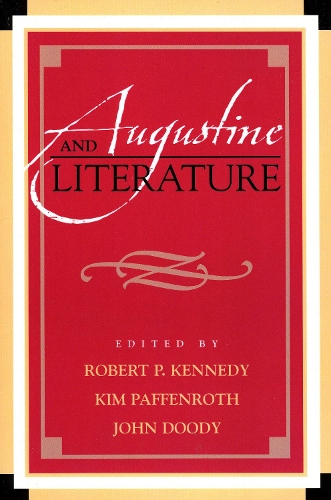
Augustine and Literature
(Paperback)
Publishing Details
Augustine and Literature
By (Author) Robert P. Kennedy
Edited by Kim Paffenroth
Edited by John Doody
Contributions by Seemee Ali
Contributions by Debra Romanick Baldwin
Contributions by Thomas F. Bertonneau
Contributions by Phillip Cary
Contributions by Paul J. Contino
Contributions by Barry L. Craig
Contributions by Mary Agnes Edsall
Bloomsbury Publishing PLC
Lexington Books
22nd December 2005
United States
Classifications
Tertiary Education
Non Fiction
Christianity
Theology
809
Physical Properties
Paperback
420
Width 161mm, Height 226mm, Spine 31mm
612g
Description
The influence of Christianity on literature has been great throughout history, as has been the influence of the great Christian, Augustine. Augustine and Literature considers the influence of Augustine on the theory and practice of an academic discipline of which he himself was not a practitioner-literature, especially poetry and fiction. The essays in this volume explore the many influences of Augustine on literature, most obviously in terms of themes and symbols, but also more pervasively perhaps in proving that literature strives for meaning through and beyond the fictional or metaphorical surface. The authors discussed in these essays, from Dante and Milton to O'Connor and Faulkner, all demonstrate a common concern that literature must be attentive to the highest things and the deepest journeys of the soul. Together these essays offer a compelling argument that literature and Augustine do belong together in the common task of guiding the soul toward the truth it desires.
Reviews
Augustine famously criticized the seductive charms of fiction, yet demonstrated his own mastery of story telling in the service of truth. In Augustine and Literature, some of our most nimble scholarly minds take up this paradox in a collection of essays which traces Augustinian themes in familiar placesthe works of Dante, the Metaphysical Poets, Milton, and Flannery O'Connoras well as among authors as diverse and unexpected as Shakespeare, Goethe, Faulkner, Rimbaud, and Ellison. Some essays explore direct Augustinian influences; others expose Augustinian affinities which cast these literary works in a sharper, provocative relief. Thoughtful and often surprising, the volume is rich with literary and theological insights which force us to think about the fundamental elements of the human condition as they bring Augustine into conversation with a host of sympathetic and contrary minds. Together the essays also initiate a broader conversation which goes beyond Augustine's thought and legacy to explore the place of literature in the intellectual life and the life well lived. Students of philosophy and theology, literature, and of the world of the imagination more generally will want to immerse themselves in this volume, and then return, refreshed and -- Todd Breyfogle, University of Denver
A wide-ranging collection of provocative and sometimes arresting essays, exploring Augustine's influence on Western poetry and fiction. The originality and range of this collection makes it indispensable for contemporary Augustinian studies. -- John Peter Kenney, Saint Michael's College
Augustine and Literature is a collection that restores the centrality of theologyand philosophic ideas generallyto the study of literary influence. It may be said of this whole, important collection and all the literary relationships it traces, what John Savoie, in it, shrewdly observes of Augustine and Milton: they "so knowingly engaged the issues and their opponents that they managed to transcend them as well." Savoie and others move us beyond the authority of Augustine to the heady interchanges best called dialogues," accepting much but challenging as well, testing and refining toward a clearer truth. -- Leslie Brisman, Yale University
Augustine famously criticized the seductive charms of fiction, yet demonstrated his own mastery of story telling in the service of truth. In Augustine and Literature, some of our most nimble scholarly minds take up this paradox in a collection of essays which traces Augustinian themes in familiar placesthe works of Dante, the Metaphysical Poets, Milton, and Flannery O'Connoras well as among authors as diverse and unexpected as Shakespeare, Goethe, Faulkner, Rimbaud, and Ellison. Some essays explore direct Augustinian influences; others expose Augustinian affinities which cast these literary works in a sharper, provocative relief. Thoughtful and often surprising, the volume is rich with literary and theological insights which force us to think about the fundamental elements of the human condition as they bring Augustine into conversation with a host of sympathetic and contrary minds. Together the essays also initiate a broader conversation which goes beyond Augustine's thought and legacy to explore the place of literature in the intellectual life and the life well lived. Students of philosophy and theology, literature, and of the world of the imagination more generally will want to immerse themselves in this volume, and then return, refreshed and enlightened to Augustine and the other authors discussed. -- Todd Breyfogle, University of Denver
Author Bio
Robert P. Kennedy is Chair of the Religious Studies Department at St. Francis Xavier University. Kim Paffenroth is Assistant Professor of Religious Studies at Iona College. John Doody is Professor of Philosophy and Associate Dean of Arts and Sciences at Villanova University.
